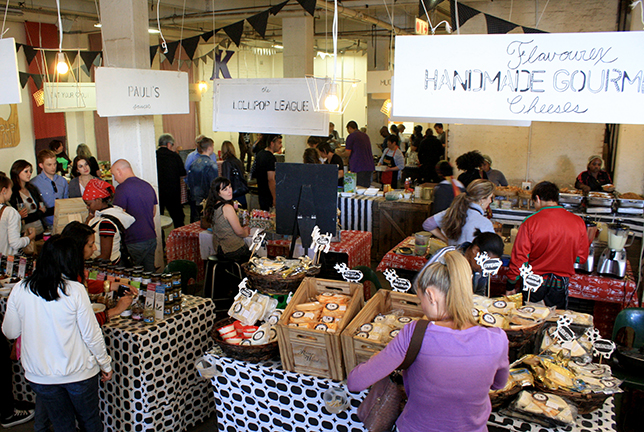
South Africa’s temperate wintertime is a great moment to discover Johannesburg‘s top markets. Safe, fun and funky, the markets allow you to plug into daily life in this South African city on the up. As long as you take a few sensible precautions — use trusted taxi companies (Cabs for Women, which also caters to men, is recommended), keep valuables out of sight, drive with the doors of your rental car locked — you shouldn’t have any trouble shopping your way around Jo’burg. And there probably isn’t a better way to relinquish a few rand than at these following markets.
Six days a week, 73 Juta Street in Braamfontein is an unremarkable city center parking garage. Come Saturday, however, and the place springs to life, courtesy of Neighbourgoods Market, a funky collection of food stalls and local clothing and jewelry designers that has been catering to the pretty people of Jo’burg since 2011. Take a seat at one of the long communal tables at the center of the market or stroll as you nibble on culinary delights encompassing everything from spicy samosas to eggs Benedict. When it comes to slaking your thirst, South African wines are available by the glass — warm up with a robust Bloemendal red on a cool day or be refreshed by a crisp sauvignon blanc from William Everson. There’s a buzzing terrace bar on the upper level of the parking garage for cocktails in the sunshine.
There’s a market with a broadly similar offering in Maboneng every Sunday. It’s part of Arts on Main, an urban regeneration precinct in the city center containing exhibition spaces, artists’ studios, gift and clothes shops and a bar and restaurant. Market on Main’s gorgeous set-up in a converted turn-of-the-20th-century warehouse complete with an olive grove courtyard garden makes for a more relaxed, family-friendly atmosphere than at Neighbourgoods, but this is still a hugely buzzy weekend hangout. On the first floor, you’ll find food and drink stalls, while upstairs it’s vintage clothing and accessories and a handful of independent designers, such as Maria McCloy, who makes a gorgeous line of bags, shoes and other accessories inspired by traditional African fabrics. Don’t forget to stop for a cup of thick Ethiopian coffee in the courtyard on your way in. Transport-wise, Maboneng runs a bus service called the Mabogo, which will take you all over Jozi.
Mai Mai Market (at Anderson and Berea streets)
Just down the street from Maboneng is Jo’burg’s traditional healers market. Open daily, Mai Mai is a must for anyone interested in indigenous African cultures. There are a few stalls selling tribal costumes, animal artifacts, walking sticks and clothing and shoes made from recycled items such as bicycle tires, but most of the market complex’s nearly 200 units are home to traditional healers. Sangomas diagnose physical and spiritual maladies and prescribe remedies, while inyangas heal via communication with spirit ancestors. All will be easily identifiable by the jars of natural medicines lining the shelves, as well as the animal bones and pelts used in the healing process. Visiting a traditional healer can be a fascinating experience, but think carefully before you ingest anything of an unknown origin. Ask permission before you take photographs in this spiritual place and be ready to offer a tip in exchange for a picture.
